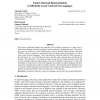Free Online Productivity Tools
i2Speak
i2Symbol
i2OCR
iTex2Img
iWeb2Print
iWeb2Shot
i2Type
iPdf2Split
iPdf2Merge
i2Bopomofo
i2Arabic
i2Style
i2Image
i2PDF
iLatex2Rtf
Sci2ools
JMLR
2010
2010
Using Contextual Representations to Efficiently Learn Context-Free Languages
We present a polynomial update time algorithm for the inductive inference of a large class of context-free languages using the paradigm of positive data and a membership oracle. We achieve this result by moving to a novel representation, called Contextual Binary Feature Grammars (CBFGs), which are capable of representing richly structured context-free languages as well as some context sensitive languages. These representations explicitly model the lattice structure of the distribution of a set of substrings and can be inferred using a generalisation of distributional learning. This formalism is an attempt to bridge the gap between simple learnable classes and the sorts of highly expressive representations necessary for linguistic representation: it allows the learnability of a large class of context-free languages, that includes all regular languages and those context-free languages that satisfy two simple constraints. The formalism and the algorithm seem well suited to natural langua...
Related Content
| Added | 19 May 2011 |
| Updated | 19 May 2011 |
| Type | Journal |
| Year | 2010 |
| Where | JMLR |
| Authors | Alexander Clark, Rémi Eyraud, Amaury Habrard |
Comments (0)

